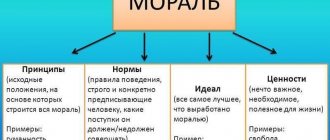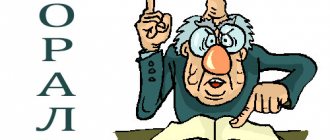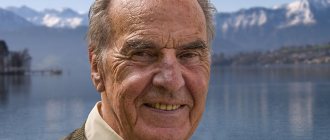Address to the student - future teacher (instead of a preface)
The basic moral, ethical, professional commandments of doctors are well known, correlated with the warning of the great thinker and healer of the East Ibn Sina (Avicenna) (980-1037): “Do no harm.” They are expressed in the Hippocratic oath (IV century BC), which is taken by graduates of medical universities. The question arises whether there are professional commandments in pedagogy that determine the nature and effectiveness of pedagogical influence. In our deep conviction, two pieces of advice for beginning teachers can be considered as such: “understand the student” and “help him learn.” Following them, taking into account the complexity of the educational process, knowledge of the mechanisms and patterns of pedagogical influence contribute to the fulfillment of the main task of education - the development and formation of the student’s personality.
The complexity of the educational process lies in the fact that, although it occupies a significant place in a person’s life, it does not give a noticeably visible concrete result immediately upon its completion. The result of education (of course, taking into account the influence of other factors, in particular heredity, family upbringing, self-education, etc.) is all subsequent behavior, activity, and lifestyle of a person. Therefore, the influence of the pedagogical influence of any educational institution cannot be controlled directly.
Everyone who chooses the profession of a teacher takes responsibility for those whom he will teach and educate, while at the same time being responsible for himself, his professional training, his right to be an Educator, Teacher, Educator. The worthy performance of professional pedagogical duty requires a person to accepting a number of obligations.
Firstly, you should objectively assess your own capabilities, know your weaknesses and strengths, qualities that are significant for this profession (features of self-regulation, self-esteem, emotional manifestations, communication, didactic abilities, etc.). For example, such a positive professional quality as a person’s ability to adequately assess and correct his behavior is one of the prerequisites for adequate influence on other people. The formation of this quality requires the future teacher to develop reflective thinking, a high level of cognitive activity and volitional self-regulation.
Secondly, the future teacher must master the general culture of intellectual activity (thinking, memory, perception, presentation, attention), the culture of behavior, communication and pedagogical communication in particular. A teacher is a model that students consciously, and more often unconsciously, imitate, adopting what the teacher does. Accordingly, a reflected and corrected image of the “I” of a student—a future teacher—requires constant personal, communicative and professional training.
Thirdly, an obligatory prerequisite and basis for the successful work of a teacher is respect, knowledge and understanding of his student as an “Other”. The student must be understood and accepted by the teacher, regardless of whether their value systems, behavior patterns and assessments coincide; it also presupposes knowledge of psychological mechanisms and patterns of behavior and communication.
Fourthly, the teacher is the organizer of the educational activities of students, their cooperation and at the same time acts as a partner and a person who facilitates pedagogical communication, i.e. “facilitator”, according to K. Rogers. This obliges the student—the future teacher—to develop his organizational and communication skills in order to be able to manage the process of students’ assimilation of knowledge, including them in active forms of educational interaction that stimulate the cognitive activity of its participants. The development of such professional skills requires not only deep psychological and pedagogical knowledge, but also constant, systematic professional training of students.
Thus, the professional qualities of a teacher must be correlated with the following postulates - the commandments of his psychological and pedagogical activity:
- respect the Human, the Personality in the student (which is a concretization of the golden rule of antiquity - treat others the way you would like to be treated);
- constantly look for opportunities for self-development and self-improvement (for it is known that those who do not study themselves cannot develop a taste for learning, a “mental appetite” in others);
— transfer knowledge to the student so that he wants and is able to master it, and is ready to use it in various situations and in his self-education.
These postulates are the essence of a concretization of the well-known thesis: only personality educates personality, only character shapes character. A teacher must be a Personality; this is his professional characteristic.
The problems of educational psychology we are considering are analyzed on the basis of a personal-activity approach in the general context of the main trends in the development of modern education. According to this approach, a) at the center of the educational process is the student himself, the formation of his personality through the means of this particular educational subject, b) the educational process implies the organization and management of students' educational activities, aimed at their comprehensive development and mastery of subject knowledge. In accordance with the personal-activity approach to learning, the book examines a number of problems that today form the foundation of educational psychology. Of these, the key ones are: interaction between the teacher and students as educational cooperation of equal partners, aimed at solving educational and cognitive problems; psychological characteristics of the teacher and students as subjects of educational activities and pedagogical communication; psychological characteristics of the educational activity itself; psychological mechanisms and patterns of assimilation, etc.
In conclusion, we note that any textbook is a structured set of scientific knowledge, points of view, concepts and theories, presented from a certain author’s position, in this case from the position of the personal-activity approach. This approach was formed in Russian psychology thanks to the efforts of scientists such as K.D. Ushinsky, M.Ya. Basov, P.F. Kapterev, L.S. Vygotsky, S.L. Rubinstein, A.N. Leontyev and many others. This approach is also consonant with the basic principles of humanistic psychology of C. Rogers.
While apologizing to the reader for typos, semantic distortions and other editorial and publishing errors in the text of the first edition, the author suggests paying attention to a number of clarifications and additions made to the text of the second edition and to a different form of citing and presenting literature.
When quoting and referring to the text of the textbook, the author asks to use its second edition.
The author is grateful to everyone who expressed their interest in further refinement of the original text of the book.
Concept of educational activity
Educational activity can be identified with the learning process, but this is not entirely true. According to D. B. Elkonin , educational activity is leading at primary school age. Also, educational activity is a special activity that should be motivated by certain motives.
Definition 1
Educational activity is the activity of an individual, during which he masters the methods of educational actions. In addition, this type of activity is aimed at the subject (the child) himself and helps personal development and the cultivation of cultural experience.
Are you an expert in this subject area? We invite you to become the author of the Directory Working Conditions
Chapter 1. Educational psychology is an interdisciplinary branch of scientific knowledge
§ 1. General scientific characteristics of educational psychology
Educational
psychology among other human sciences
In modern science, the interaction of two main trends in its development is increasingly visible: integration and differentiation of scientific branches, disciplines, problem areas (along with such trends as systematization, hierarchization, cumulativeness). Analyzing the integrativeness of science, J. Piaget, B.G. Ananyev, B.M. Kedrov noted that at the center of scientific knowledge is psychology - the science of man. Interpretation of the presentation by B.M. Kedrov’s triangle of scientific knowledge (its apex is the natural sciences, its base corners are philosophy and social sciences, and in the center psychology, connected with these sciences) correlates with the statement of J. Piaget that “... psychology occupies a central place not only as a product of all other sciences, but also as a possible source of explanation for their formation and development” [172, p. 155].B.G. defines the role of the human problem in the development of science even more clearly. Ananyev [7], according to whom differentiation, deepening the study of man and at the same time integration of all research in this area contribute to the fact that the problem of man becomes general scientific. The same trend of globalization of the human problem was outlined in the field of pedagogical knowledge by K.D. Ushinsky in 1868-1869. in the work “Man as a subject of education. Experience of pedagogical anthropology”, where, based on the definition of the hierarchy of sciences that contribute to human education, the leading role of psychology was noted.
In turn, psychology is also complex integrated knowledge, the basis of the structural representation of which, according to A.V. Petrovsky, serve the psychological aspects: “1) specific activity, 2) development, 3) the relationship of a person (as a subject of development and activity) to society (in which his activity and development takes place)” [39, p. 80]. Educational psychology is considered as an independent branch of general psychological knowledge, distinguished primarily on the basis of “concrete activity”, in which two other aspects of it are reflected. This statement means that the foundation of educational psychology contains general psychological patterns and mechanisms of educational activity itself, or, as defined by one of the founders of educational psychology, P.F. Kapterev, educational process.
Educational psychology is related to many other sciences for a number of reasons. Firstly, it is a specific branch of general psychological knowledge, which is located in the center of the triangle of scientific knowledge. Secondly, it is connected with other sciences due to the fact that the educational process, in its goals and content, is the transfer of sociocultural experience, which accumulates the most diverse civilizational knowledge in a symbolic, linguistic form. Thirdly, the subject of its study is the person who knows and learns this knowledge, which is studied by many other human sciences. It is obvious that educational psychology is inextricably linked with such sciences as, for example, pedagogy, physiology, philosophy, linguistics, sociology, etc. At the same time, the statement that educational psychology is a branch of general psychological knowledge means that it is formed on its basis, those. knowledge about mental development, its driving forces, individual and gender-age characteristics of a person, his personal formation and development, etc. Because of this, educational psychology is connected with other branches of psychological knowledge (social, differential psychology, etc.) and, above all, with developmental psychology.
Pedagogical and developmental psychology are most closely related to each other by the commonality of the object of these sciences, which is the developing person. But if developmental psychology studies “the age-related dynamics of the human psyche, the ontogenesis of mental processes and psychological qualities of a developing person” [43, p. 5], then pedagogical - the conditions and factors for the formation of mental new formations under the influence of education. In this regard, all problems of educational psychology are considered on the basis of taking into account the age characteristics of a person in the educational process. At the same time (let us once again emphasize this point) both pedagogical and developmental psychology are based on knowledge of general psychology, which “... reveals general psychological patterns, studies mental processes, mental states and individual psychological characteristics of the personality of an already established person” [96, With. 7]. This interpretation, on the one hand, of interdisciplinarity, and on the other, of the independence of educational psychology as a branch of scientific knowledge, can be correlated with the position of B.G. Ananyeva. In his opinion, educational psychology is a borderline, complex field of knowledge, which “... has taken a certain place between psychology and pedagogy, and has become a field of joint study of the relationships between the upbringing, training and development of younger generations” [8, p. 14].
However, this interpretation does not completely coincide with the definitions of the status of educational psychology given by other authors, which may indicate that the solution to this issue is ambiguous. For example, in the “Course of General, Developmental and Pedagogical Psychology” about [101, p. 4]. On the other hand, the “Fundamentals of Pedagogy and Psychology of Higher School” emphasizes the complexity and unity of pedagogy and psychology, forming one comprehensive scientific discipline [157, p. 5-6]. It can be assumed that educational psychology is essentially complex. Pedagogy in its theoretical, according to V.I. Ginetsinsky [52], and practical aspects is an independent science closely related to it, while general and developmental psychology are internally inextricably linked branches of general psychological knowledge.
General psychological
context of the formation of educational psychology
Educational psychology develops in the general context of scientific ideas about man, which were recorded in the main psychological movements (theories) that have had and are having a great influence on pedagogical thought in each specific historical period. This is due to the fact that the learning process has always acted as a natural research “testing ground” for psychological theories. Let us take a closer look at the psychological movements and theories that could influence the understanding of the pedagogical process.
Associative psychology
(starting from the middle of the 18th century - D. Hartley and until the end of the 19th century - W. Wundt), in the depths of which the types and mechanisms of associations were defined as connections between mental processes and associations as the basis of the psyche. Using the material from the study of associations, the features of memory and learning were studied. Here we note that the foundations of the associative interpretation of the psyche were laid by Aristotle (384-322 BC), who is credited with introducing the concept of “association”, its types, distinguishing two types of reason (nous) into theoretical and practical, definitions feelings of satisfaction as a learning factor.
Empirical data from experiments
G. Ebbinghaus (1885) on the study of the process of forgetting and the forgetting curve he obtained, the nature of which is taken into account by all subsequent researchers of memory, development of skills, organization of exercises.
Pragmatic functional psychology
W. James (late 19th - early 20th centuries) and J. Dewey (practically the entire first half of our century) with an emphasis on adaptive reactions, adaptation to the environment, body activity, and skill development.
Trial and error theory
E. Thorndike (late 19th - early 20th centuries), who formulated the basic laws of learning - the laws of exercise, effect and readiness; who described the learning curve and achievement tests based on these data (1904).
Behaviorism
J. Watson
(1912
-
1920)
and
neobehaviorism of
E. Tolman, K. Hull, A. Ghazri and B. Skinner (the first half of our century). V. Skinner already in the middle of this century developed the concept of operant behavior and the practice of programmed training. The merit of the works of E. Thorndike, orthodox behaviorism of J. Watson and the entire neo-behaviourist movement that preceded behaviorism is the development of a holistic concept of learning, including its patterns, facts, mechanisms.
Research by F. Galton (late 19th century) in the field of measuring sensorimotor functions,
which laid the foundation for testing (F. Galton was the first to use questionnaires and rating scales); use of mathematical statistics; “mental tests” by J. Cattell, which, as A. Anastasi notes, were considered a typical research method of that time. Intellectual tests by A. Wiene and T. Simon (1904-1911) with a variation of individual and group testing, in which the intellectual development coefficient was first used as the ratio of mental age to actual age (L. Theremin in America in 1916). It is significant that F. Galton began his first (1884) measurements in the education system, J. Cattell (1890) tested college students in America, the first Binet-Simon scale (1905) was created in France on the initiative of the Ministry of Education. This indicates a fairly long-standing close relationship between psychological research and education.
Psychoanalysis
3. Freud, A. Adler, K. Jung, E. Fromm, E. Erikson (from the end of the 19th century and throughout the 20th century), developing the categories of the unconscious, psychological defense, complexes, stages of development of the “I”, freedom , extroversion-introversion. (The latter finds the widest application and distribution in many pedagogical studies thanks to the G. Eysenck test.)
Gestalt psychology
(M. Wertheimer, W. Köhler, K. Koffka - early 19th century), the concept of a dynamic system of behavior or the field theory of K. Lewin, genetic epistemology or the concept of staged development of intelligence by J. Piaget, which contributed to the formation of the concepts of insight and motivation , stages of intellectual development, internalization (which was also developed by French psychologists of the sociological direction A. Vallon, P. Janet).
Operational concept
J. Piaget, starting from the 20s of our century, has become one of the main world theories of the development of intelligence and thinking. In the context of this concept, the concepts of socialization, centering-decentration, specificity of adaptation, reversibility of actions, and stage of intellectual development are developed. It should be noted that in the science of the 20th century. J. Piaget entered primarily as one of the most prominent representatives of the “synthetic approach to the study of the psyche” [104, p. 26].
Cognitive psychology
60-80s of our century G.U. Neisser, M. Broadbent, D. Norman, J. Bruner and others, who focused on knowledge, awareness, organization of semantic memory, forecasting, reception and processing of information, reading and comprehension processes, cognitive styles.
Humanistic
psychology of the 60-90s of our century by A. Maslow, K. Rogers, which put forward the concept of “client-centered” therapy, the category of self-actualization, the pyramid (hierarchy) of human needs, facilitation (relief and activation), which formed a student-centered humanistic approach to training.
The development of educational psychology was greatly influenced by the works of domestic thinkers, teachers, naturalists - I.M. Sechenov, I.P. Pavlov, K.D. Ushinsky, A.F. Lazursky, P.F. Lesgaft, L.S. Vygotsky , P.P. Blonsky, etc. Pedagogical anthropology
K.D. Ushinsky (1824-1870). It affirmed the educational nature of learning, the active (active) nature of man. K.D. Ushinsky is responsible for the development of content categories and teaching methods.
Cultural-historical theory
L.S. Vygotsky (1896-1934) - the theory of the development of the psyche, conceptual thinking, speech, the connection between learning and development, where the first should anticipate and lead the second, the concept of levels of development, the “zone of proximal development” and many other fundamental provisions to varying degrees completeness formed the basis of psychological and pedagogical concepts of recent decades. Concept of activity of M.Ya. Basov, theory of activity by A.N. Leontyev, general methodological development of the category of activity itself (especially in terms of subjectivity) S.L. Rubinstein, a general integrative approach to the psyche, determining the specifics of its development during adulthood, identifying a special age period - student age B.G. Ananyev and others had an undoubted influence on the psychological and pedagogical understanding of the educational process and the development of educational psychology.
The theories, concepts, interpretations of teaching, and educational activities that were formed in Russian psychology in the middle of the current century
(D.N. Bogoyavlensky, G.S. Kostyuk, N.A. Menchinskaya, P.A. Shevarev, Z.I. Kalmykova, P.Ya. Galperin, N.F. Talyzina, D.B. Elkonin, V L.V. Davydov, A.K. Markova, L.I. Aidarova, L.V. Zankov, L.N. Landa, G.G. Granik, A.A. Lyublinskaya, I.V. Kuzmina, etc.) made an invaluable contribution not only to the understanding of teaching practice, but also to educational psychology as a science developed both in our country and in other countries (I. Lingart, J. Lompscher, etc.).
The development of educational psychology was greatly influenced by the identification of specific mechanisms
for students’ assimilation of educational material (S.L. Rubinshtein, E.N. Kabanova-Meller, L.B. Itelson);
studies of memory
(P.I. Zinchenko, A.A. Smirnov, V.Ya. Lyaudis), thinking (F.N. Shemyakin, A.M. Matyushkin, V.N. Pushkin, L.L. Gurova),
perception (V. P.
Zinchenko, Yu.B. Gippenreiter),
child development
and, in particular,
speech development
(M.I. Lisina, L.A. Wenger, A.G. Ruzskaya, F.A. Sokhin, T.N. Ushakova ),
personality development
(B.G. Ananyev, L.I. Bozhovich, M.S. Neimark, V.S. Mukhina),
speech communication and speech training
(V.A. Artemov, N.I. Zhinkin, A.A. Leontyev , V.A. Kan-Kalik);
determination of stages
(eras, epochs, phases, periods)
of age development
(P.P. Blonsky, L.S. Vygotsky, A.N. Leontiev, D.B. Elkonin, B.G. Ananyev, A.V. Petrovsky) , features of mental
activity of schoolchildren
and their mental talent (A.A. Bodalev, N.S. Leites, N.D. Levitov, V.A. Krutetsky).
the psychology of adult learning
were of great importance for educational psychology . Textbooks on educational and developmental psychology, educational psychology by M.N. played an unconditional positive role in the process of scientific reflection of the achievements of educational psychology. Shardakova, V.A. Krutetsky, A.V. Petrovsky and others1
How is it different from the traditional system?
The Elkonin-Davydov education system has long become official for Russian schools. But it differs significantly from the classic version in terms of goals, methods and results.
| Classical system | Elkonin-Davydov system |
| Promotes empirical thinking | Develops theoretical thinking |
| Cognition proceeds from the particular to the general, from clearly defined concepts to the system, from the phenomenon as a whole to its essence. | The study proceeds from general explanations to specific examples, from abstract objects to concrete ones, from systems to individual concepts. |
| Children receive ready-made knowledge, concepts that need to be learned | Children are in conditions where they themselves come to understand this or that law, action, phenomenon |
| Cognition method: reproductive | Cognition method: research |
| The child is the object of the educational process | The child is a subject |
| Form of training: individual | Educational dialogue |
| Main result: knowledge | The ability to get them |
| Form of work: most often individual | Children work in large and small groups |
We could continue this table for a long time, but the main differences between Elkonin-Davydov’s developmental education lie precisely in these principles.
What are the learning outcomes?
Elkonin-Davydov developmental education system:
- Helps personal growth and self-development.
- The child develops logical thinking.
- Children strive not to get good grades, but to gain new knowledge, skills and achievements.
- Students acquire a lot of theoretical knowledge, which gives them the opportunity to solve practical problems.
- Upon graduating from primary school, children acquire creative potential, reflection, the ability to analyze information and plan their activities.
- This system teaches self-analysis, adequate self-esteem and self-criticism.
The program was experimental for a long time, monitoring the progress of children in comparison with students in regular schools was (and is) ongoing. The tests show high rates of mastery of educational material, the level of higher mental functions, and communication abilities.
Children who have completed primary school through the developmental education system have a higher level of the following indicators:
- attention, memory;
- solving non-standard problems;
- performing operations such as generalization and classification;
- general awareness;
- imagination;
- teamwork skills;
- intelligence in difficult situations;
- motivation for success.










